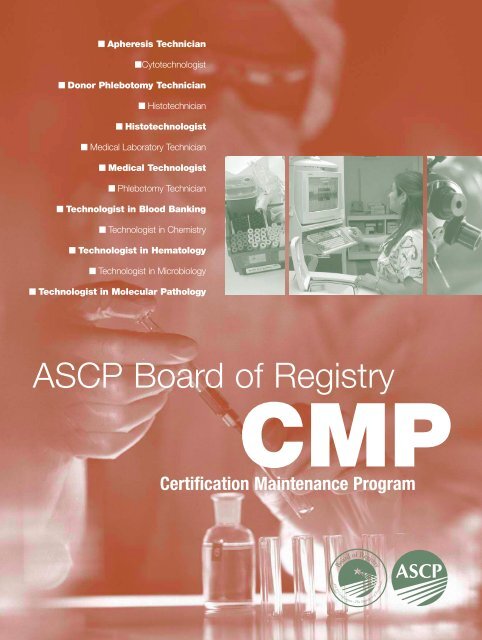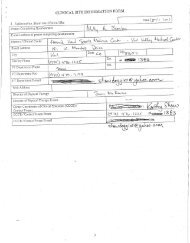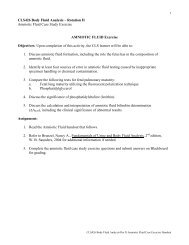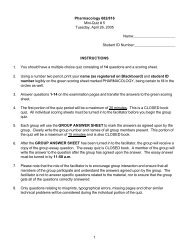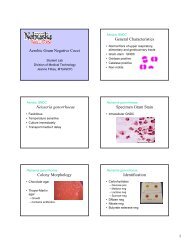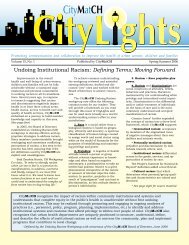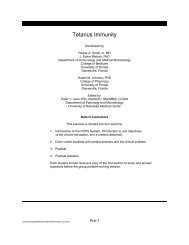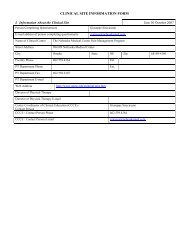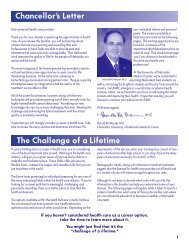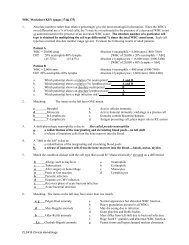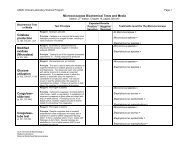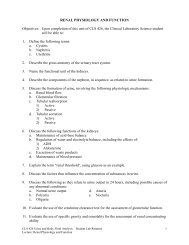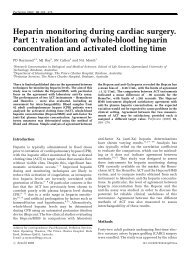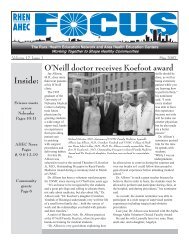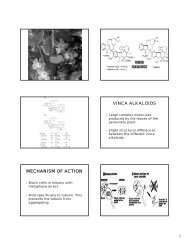ASCP Board of Registry - UNMC
ASCP Board of Registry - UNMC
ASCP Board of Registry - UNMC
Create successful ePaper yourself
Turn your PDF publications into a flip-book with our unique Google optimized e-Paper software.
Apheresis Technician<br />
Cytotechnologist<br />
Donor Phlebotomy Technician<br />
Histotechnician<br />
Histotechnologist<br />
Medical Laboratory Technician<br />
Medical Technologist<br />
Phlebotomy Technician<br />
Technologist in Blood Banking<br />
Technologist in Chemistry<br />
Technologist in Hematology<br />
Technologist in Microbiology<br />
Technologist in Molecular Pathology<br />
<strong>ASCP</strong> <strong>Board</strong> <strong>of</strong> <strong>Registry</strong><br />
CMP<br />
Certification Maintenance Program
The <strong>ASCP</strong> <strong>Board</strong> <strong>of</strong> <strong>Registry</strong> has long been concerned with improving the initial<br />
certification process and assuring the continued competence <strong>of</strong> medical laboratory<br />
personnel. Increasingly, oversight agencies are being challenged to provide assurance to<br />
the public that the health pr<strong>of</strong>essions meet minimal levels <strong>of</strong> competence throughout<br />
their careers. Because the <strong>Board</strong> <strong>of</strong> <strong>Registry</strong> has long held the belief that individuals<br />
should maintain and document their competence, a new certification maintenance<br />
program has recently been developed.<br />
The Certification Maintenance Program, currently required for individuals newly certified<br />
in 2004 in the entry level categories, is also now available to individuals who were<br />
certified prior to 2004 on a voluntary basis. Current certificants will be able to<br />
demonstrate their competency by participating in this program and receiving a new<br />
certificate every three years. Individuals who successfully complete the program will<br />
receive a certificate valid for three years as well as the designation “CM” in superscript<br />
after their certification designation [e.g., MT(<strong>ASCP</strong>) CM ]. The goal <strong>of</strong> the program is to<br />
demonstrate to the public that laboratory pr<strong>of</strong>essionals with this new designation are<br />
performing activities to stay current in their practice.<br />
All requirements and fees stated in this program are subject to change without notice.
TABLE OF<br />
CONTENTS<br />
How the Program Works 2<br />
Point Allocation 2<br />
Declaration <strong>of</strong> Certification Maintenance 2<br />
Renewal and Deadline Dates 3<br />
Documentation for Audit 3<br />
Successful Program Completion 3<br />
Verification <strong>of</strong> Certification 3<br />
Certified 2004 and Beyond 3<br />
Certified Prior to 2004 3<br />
BOR CMP Guidelines Chart 4<br />
Guidelines for Earning CMP Points 5<br />
Suggested List <strong>of</strong> Providers 6<br />
Self-Assessment Form 7<br />
Declaration and Completion <strong>of</strong> CMP 11<br />
Declaration 11<br />
Successful Completion <strong>of</strong> CMP 11<br />
Audit Procedure 12<br />
Required Documentation 12<br />
Submission Procedures 13<br />
Review and Appeals Process 13<br />
Frequently Asked Questions 14
HOW THE PROGRAM<br />
WORKS<br />
Individuals newly certified beginning January 2004 in the entry-level categories will be<br />
required to participate in the BOR Certification Maintenance Program in order to<br />
maintain their certification status. The certification categories requiring CMP are<br />
indicated below.<br />
Apheresis Technician [AT]<br />
Cytotechnologist [CT]<br />
Donor Phlebotomy Technician [DPT]<br />
Histotechnician [HT]<br />
Histotechnologist [HTL]<br />
Medical Laboratory Technician [MLT]<br />
Medical Technologist [MT]<br />
Phlebotomy Technician [PBT]<br />
Technologist in Blood Banking [BB]<br />
Technologist in Chemistry [C]<br />
Technologist in Hematology [H]<br />
Technologist in Microbiology [M]<br />
Technologist in Molecular Pathology [MP]<br />
To successfully complete the program, documented activities demonstrating continued<br />
competence must be completed within a three-year period. For individuals certified<br />
beginning in January 2004, the certificate is time limited and expires after a three-year<br />
period. The Certification Maintenance Program (CMP) as described in this booklet, must be<br />
completed every three years to maintain certification. A self-assessment form is provided in<br />
this booklet to assist you in planning your activities over the next several years.<br />
Point Allocation<br />
Activities are awarded points based on the Guidelines on page 4. Thirty-six (36) points <strong>of</strong><br />
documented continued competence activities must be completed every three years for<br />
all categories <strong>of</strong> certification except Phlebotomy Technician (PBT). For PBT, 9 points are<br />
required every three years.<br />
For MT and MLT, the following points must be accumulated during the three year period<br />
following certification:<br />
4<br />
2 points minimum in each <strong>of</strong> the following domains: blood banking, chemistry,<br />
hematology, immunology, microbiology<br />
1 point minimum in safety<br />
Remaining points in the area(s) <strong>of</strong> laboratory specialty, management, education or<br />
other related laboratory areas <strong>of</strong> interest<br />
For other technicians and technologists (PBT, AT, DPT, HT, HTL, CT, BB, C, H, M, MP),<br />
the following points are required within the three year period:<br />
1 point minimum in safety<br />
2 points minimum in the area in which you are certified<br />
Remaining points in the area <strong>of</strong> specialty, management, education or other related<br />
laboratory areas <strong>of</strong> interest<br />
Please retain copies <strong>of</strong> all certificates <strong>of</strong> attendance or any other type <strong>of</strong> documentation<br />
in this folder for auditing purposes. (See pages 11 and 12.)<br />
If you are certified in more than one category after January 1, 2004, you will be<br />
required to complete the CMP for each category in which you became certified in 2004<br />
or beyond to demonstrate maintenance <strong>of</strong> competence. However, you may use the<br />
same activities for more than one category <strong>of</strong> certification. For example, the same<br />
activity (worth 1 point) in laboratory safety may be used for both MT and C.<br />
Declaration <strong>of</strong> Certification Maintenance<br />
A declaration is enclosed in this packet. After you have completed the necessary<br />
continuing competence activities, this declaration form should be completed in its entirety
and submitted to the <strong>Board</strong> <strong>of</strong> <strong>Registry</strong> <strong>of</strong>fice along with the required fee. The current fee<br />
is $50. Please check the BOR website at www.ascp.org/bor for the most current fee<br />
before submitting your declaration. Detailed information is provided on page 11.<br />
Failure to Participate in CMP<br />
If you are certified beginning in 2004 and choose not to participate in the Certification<br />
Maintenance Program, your certificate will no longer be valid after the three year time period<br />
printed on the certificate. You will no longer be permitted to use the (<strong>ASCP</strong>) certification<br />
designation after your name. Information on reinstatement is located on page 13.<br />
Renewal and Deadline Dates<br />
You will be required to complete all continuing competence activities within the three-year<br />
validation period indicated on your certificate. Activities may not be carried over from one<br />
period to the next. For example, if your validation dates are February 1, 2004 through<br />
January 31, 2007, you will need to complete your continuing competence activities<br />
between those dates. Activities before and after these dates will not be accepted.<br />
The completed declaration should be submitted at least two months prior to the<br />
ending validation date on your certificate (e.g., by November 30, 2006 for the ending<br />
validation date <strong>of</strong> January 31, 2007) to ensure that you receive your new certificate prior<br />
to the expiration date on your current certificate.<br />
Documentation for Audit<br />
A percentage <strong>of</strong> declarations will be audited to verify completion <strong>of</strong> the program. If your<br />
declaration is selected for audit, you will be notified and required to submit documentation<br />
verifying all activities that were submitted for the program. (See Audit Procedures on page<br />
12 for further information.)<br />
Successful Program Completion<br />
Upon successful completion <strong>of</strong> the program, you will receive a new certificate valid for<br />
three years and a CMP packet for the next time period. The designation “CM”, as a<br />
superscript, may be used after your initials to indicate that you have successfully<br />
maintained your certification [e.g., MT(<strong>ASCP</strong>) CM ].<br />
VERIFICATION OF<br />
CERTIFICATION<br />
Certified 2004 and Beyond<br />
If you are certified beginning in 2004, you are required to complete the Certification<br />
Maintenance Program every three years for your certification to remain valid. You will<br />
receive a new certificate after successful completion <strong>of</strong> the program every three years.<br />
You will be entitled to use the initials “CM” in superscript after your certification intials<br />
[e.g., MT(<strong>ASCP</strong>)] for the period your new certification is valid. This original certificate is<br />
verification <strong>of</strong> your certification and may be presented to employers, state licensing<br />
boards, etc as pro<strong>of</strong> <strong>of</strong> your valid <strong>ASCP</strong> certification. Copies <strong>of</strong> certificates are not valid<br />
for pro<strong>of</strong> <strong>of</strong> certification.<br />
If you choose not to participate in the Program, you will not be permitted to use the<br />
certification initials after your name [e.g., MT(<strong>ASCP</strong>) CM ] when your certificate expires<br />
since your certification is no longer valid.<br />
Certified Prior to 2004<br />
Upon successful completion <strong>of</strong> the program, you may use the initials “CM” in<br />
superscript, after your certification initials [e.g., MT(<strong>ASCP</strong>) CM ] for the period your new<br />
certificate is valid. If you choose not to continue your participation in the program, you<br />
may no longer use the superscript “CM” after your certification initials. However, you will<br />
still continue to use your certification initials and your original certification remains valid,<br />
since this is a voluntary program for those certified prior to 2004.<br />
5
BOR CMP<br />
GUIDELINES<br />
PBT—minimum <strong>of</strong> 9 points within the 3-year period<br />
All other categories—minimum <strong>of</strong> 36 points within the 3-year period<br />
For generalists (MT & MLT)—2 points minimum required in each domain (blood banking, chemistry,<br />
hematology, immunology, microbiology), 1 point minimum in safety and remaining points in area(s) <strong>of</strong> laboratory<br />
specialty, management, education, and/or other related laboratory area(s) <strong>of</strong> interest.<br />
For categorical technicians and technologists (PBT, AT, DPT, HT, HTL, CT, BB, C, H, M, MP)—<br />
1 point minimum in safety; 2 points minimum in the area in which you are certified; remaining in area <strong>of</strong> specialty,<br />
management, education and/or other related laboratory areas <strong>of</strong> interest.<br />
Activities* Contact/Credit Hours CMP Points<br />
1. Formal continuing education courses: 1 contact hour 1<br />
**ACCME, <strong>ASCP</strong> CMLE, AACC ACCENT, ASCLS PACE, CE programs<br />
(50-60 minutes)<br />
sponsored by other pr<strong>of</strong>essional societies (including state, regional<br />
and local societies and chapters), universities and colleges<br />
2. Employer-<strong>of</strong>fered courses (in-service, instrument training, vendor-sponsored, etc.) 1 contact hour 1<br />
(50-60 minutes)<br />
3. College/university coursework (science, computer management, education or 1 quarter hour 10<br />
other courses relevant to your laboratory career) 1 semester hour 15<br />
4. Teleconferences, subscription or online self-instructional courses 1 contact hour 1<br />
for which ACCME, CMLE, ACCENT, PACE or other pr<strong>of</strong>essional society<br />
(50-60 minutes)<br />
credits are awarded (see page 5)<br />
5. Completion <strong>of</strong> advanced <strong>ASCP</strong> certification or qualification:<br />
Specialist/Diplomate certification 25<br />
Categorical or higher level certification 12<br />
Qualification 12<br />
6. Competence Assessment by employer 2 (per year)<br />
7. Research & preparation for presenting a workshop or course (first time only) each contact hour <strong>of</strong> presentation 3<br />
(50-60 minutes)<br />
8. Authoring journal articles for peer-reviewed publications 5<br />
9. Authoring a book (over 300 pages) 21<br />
(under 300 pages) 14<br />
(chapter in a book) 7<br />
10. Editing a book 5<br />
11. Doctoral dissertation 10<br />
12. Masters thesis 4<br />
13. Presenting posters/exhibits 3<br />
14. Serving on examination committees 2 (per year)<br />
15. Serving on committees/boards related to the pr<strong>of</strong>ession (national, state, regional, local) 2 (per year)<br />
16. On site inspector for laboratory accreditation (CAP, JCAHO, AABB, COLA, state agency) 1 (per year)<br />
or training program accreditation (NAACLS, CAAHEP)<br />
* Activities must be related to area <strong>of</strong> specialty and safety as indicated.<br />
** ACCME (Accreditation Council for Continuing Medical Education), <strong>ASCP</strong> CMLE (American Society for Clinical Pathology–Continuing Medical<br />
Laboratory Education), AACC ACCENT (American Association for Clinical Chemistry–ACCENT programs), ASCLS PACE (American Society <strong>of</strong><br />
Clinical Laboratory Science–PACE programs)<br />
PLEASE NOTE: Because <strong>of</strong> the large volume <strong>of</strong> continuing education programs available, the <strong>Board</strong> <strong>of</strong> <strong>Registry</strong> will not respond to<br />
requests for approval <strong>of</strong> individual programs. If the program meets the criteria as described above, it will be accepted for CMP points.<br />
6
GUIDELINES FOR<br />
EARNING CMP POINTS<br />
The chart on page 4 outlines the number <strong>of</strong> points required to complete the Certification<br />
Maintenance Program and the activities for which points are awarded.<br />
1. Formal continuing education courses—These courses may be completed through the<br />
programs/organizations listed on the chart as well as through other pr<strong>of</strong>essional<br />
societies such as those listed under Suggested List <strong>of</strong> Providers on page 6. Courses<br />
<strong>of</strong>fered by state/regional/local societies and chapters are acceptable as well as<br />
courses <strong>of</strong>fered through the continuing education departments <strong>of</strong> colleges and<br />
universities. Courses <strong>of</strong>fered by organizations approved by state licensing boards are<br />
also acceptable.<br />
Please Note: Because <strong>of</strong> the large volume <strong>of</strong> continuing education courses available, the <strong>Board</strong><br />
or <strong>Registry</strong> will not respond to requests for approval <strong>of</strong> individual programs or courses. If the<br />
program/ course meets the criteria listed, it will be accepted for CMP points.<br />
2. Employer-<strong>of</strong>fered coursework—Programs, workshops, and in-services <strong>of</strong>fered<br />
through your employer or sponsored by a vendor will all qualify for the CMP.<br />
3. College/university coursework—Courses in the natural sciences, computer sciences,<br />
management, education or other courses relevant to your laboratory career or current<br />
area <strong>of</strong> practice are all acceptable.<br />
4. Teleconference, subscription, or online self-instructional courses—These courses are<br />
acceptable based on any <strong>of</strong> the following criteria:<br />
a. ACCME, CMLE, ACCENT, PACE credits are awarded OR<br />
b. They are <strong>of</strong>fered by a pr<strong>of</strong>essional society (including state, regional or local chapter)<br />
OR<br />
c. The course is accepted by a state licensing board OR<br />
d. The course is <strong>of</strong>fered through a university or college.<br />
Please Note: Because <strong>of</strong> the large volume <strong>of</strong> continuing education courses available, the <strong>Board</strong><br />
or <strong>Registry</strong> will not respond to requests for approval <strong>of</strong> individual programs or courses. If the<br />
program/ course meets the criteria listed, it will be accepted for CMP points.<br />
5. Completion <strong>of</strong> advanced <strong>ASCP</strong> certification or qualification—Achievement <strong>of</strong> a<br />
Specialist or Diplomate certification in the following categories is acceptable for 25<br />
CMP points: Hemapheresis Practitioner (HP), Specialists in Blood Banking (SBB),<br />
Chemistry (SC), Cytotechnology (SCT), Hematology (SH), Laboratory Safety (SLS),<br />
Microbiology (SM), Virology (SV) and Diplomate in Laboratory Management (DLM)<br />
Categorical certification or higher level certification [e.g., Histotechnologist (HTL) for<br />
Histotechnician (HT)] is acceptable for 12 CMP points: Histotechnologist (HTL),<br />
Technologists in Blood Banking (BB), Chemistry (C), Hematology (H), Microbiology (M)<br />
and Molecular Pathology (MP).<br />
Qualifications are also worth 12 CMP points: Qualifications in Cytometry (QCYM),<br />
Immunohistochemistry (QIHC), Laboratory Compliance (QLC), Laboratory Informatics<br />
(QLI) and Point <strong>of</strong> Care Testing Evaluator (QPOCTE).<br />
6. Competence assessment by employer—You may receive up to 2 CMP points per<br />
year for completion <strong>of</strong> an employer assessment form. Your employer must complete<br />
the enclosed competence assessment form to document your continued<br />
competency in the area(s) <strong>of</strong> your employment. The date <strong>of</strong> the assessment must be<br />
included on this form.<br />
7. Research and preparation for presenting a workshop or course—You may receive 3<br />
CMP points for each contact hour <strong>of</strong> a presentation/workshop you prepare and<br />
7
deliver for the first time only. Subsequent presentations <strong>of</strong> the same workshop are not<br />
awarded any points.<br />
8. Authoring journal articles for peer-reviewed publications—Points are awarded for<br />
writing articles in peer-reviewed journals in the laboratory field or in journals for<br />
pr<strong>of</strong>essional associations in the areas <strong>of</strong> education and management.<br />
9./10. Authoring a book/chapter or editing a book—See guidelines on page 4 for points awarded.<br />
11./12. Doctoral dissertation or masters thesis—See guidelines on page 4 for points awarded.<br />
13. Presenting a poster or exhibit—Points are awarded for posters or exhibits presented<br />
at national, state, regional or local laboratory pr<strong>of</strong>essional association meetings.<br />
14./15. Serving on examination committees or other committees/boards related to the<br />
pr<strong>of</strong>ession including national, regional, state, local pr<strong>of</strong>essional organizations or<br />
committee appointments at your place <strong>of</strong> employment—See guidelines on page 4 for<br />
points awarded.<br />
16. Lab inspector for JCAHO/CAP/AABB/ COLA/ state agency or On-site inspector for<br />
NAACLS/CAAHEP—See guidelines on page 4.<br />
SUGGESTED LIST<br />
OF PROVIDERS<br />
Below is a partial list <strong>of</strong> providers who <strong>of</strong>fer continuing education activities including<br />
workshops, teleconferences, subscription programs, online courses, etc.<br />
This list is only a partial list to assist you in planning your activities.<br />
State/regional/local pr<strong>of</strong>essional societies and other organizations recognized by state<br />
licensing boards may not be represented on this list; however, courses provided by<br />
these groups are acceptable for CMP points.<br />
Please Note: Because <strong>of</strong> the large volume <strong>of</strong> continuing education programs available, the <strong>Board</strong> <strong>of</strong> <strong>Registry</strong> will<br />
not respond to requests for approval <strong>of</strong> individual programs. If the program meets the criteria described under<br />
Guidelines for Earning CMP Points, it will be acceptable for CMP Points.<br />
AABB—American Association <strong>of</strong> Blood Banks<br />
AACC “ACCENT”—American Association for Clinical Chemistry<br />
AMA—American Medical Association<br />
AMT—American Medical Technologists<br />
ASCLS PACE—American Society <strong>of</strong> Clinical Laboratory Science<br />
ASC—American Society <strong>of</strong> Cytopathology<br />
<strong>ASCP</strong> CMLE—American Society for Clinical Pathology<br />
ASCT—American Society for Cytotechnology<br />
ASFA—American Society for Apheresis<br />
ASH—American Society <strong>of</strong> Hematology<br />
ASM—American Society <strong>of</strong> Microbiology<br />
CACMLE—Colorado Association for Continuing Medical Laboratory Education<br />
CAP—College <strong>of</strong> American Pathologists<br />
CLMA—Clinical Laboratory Management Association<br />
CMEA—Continuing Medical Education Association<br />
CSMLS—Canadian Society for Medical Laboratory Science<br />
Excell<br />
JCAHO—Joint Commission on the Accreditation <strong>of</strong> Healthcare Organizations<br />
NSH—National Society for Histotechnology<br />
The American Red Cross<br />
8
SELF-ASSESSMENT<br />
FORM (For your personal use only. Do not submit with your declaration.)<br />
As a first step in the Certification Maintenance Program, this self-assessment form is<br />
designed to assist you in setting your goals and determining the appropriate activities to<br />
meet those goals and successfully complete this program. To help you determine your<br />
pr<strong>of</strong>essional direction and identify your learning needs, complete the following questions.<br />
1. My current responsibilities are:<br />
(e.g., management, teaching students blood banking, etc.)<br />
2. Areas <strong>of</strong> pr<strong>of</strong>essional interest to me:<br />
(e.g., teaching, management, laboratory compliance, etc.)<br />
9
3. The areas <strong>of</strong> my pr<strong>of</strong>ession that I enjoy:<br />
(e.g., personal interests related to pr<strong>of</strong>essional growth, etc.)<br />
4. My pr<strong>of</strong>essional strengths are:<br />
(May be based on feedback from peers, performance evaluations, self-assessment modules, etc.)<br />
5. I would like to improve my knowledge in the areas <strong>of</strong>:<br />
10
6. External factors or trends (pr<strong>of</strong>essional, societal, or environmental) that are affecting or will<br />
affect my pr<strong>of</strong>ession:<br />
7. My Goals:<br />
(When developing your goals, refer to Questions 1–6 on the previous pages.)<br />
11
Activities to Meet My Goals:<br />
Activity<br />
CMP Points<br />
Please keep in mind the following requirements:<br />
PBT—minimum <strong>of</strong> 9 points within the 3-year period<br />
All other categories—minimum <strong>of</strong> 36 points within the 3-year period<br />
For generalists (MT & MLT)—2 points minimum required in each domain (blood banking,<br />
chemistry, hematology, immunology, microbiology), 1 point minimum in safety and remaining<br />
points in area(s) <strong>of</strong> laboratory specialty, management, education, and/or other related laboratory<br />
area(s) <strong>of</strong> interest.<br />
For categorical technicians and technologists (PBT, AT, DPT, HT, HTL, CT, BB, C, H, M,<br />
MP)—1 point minimum in safety; 2 points minimum in the area in which you are certified;<br />
remaining in area <strong>of</strong> specialty, management, education and/or other related laboratory areas <strong>of</strong><br />
interest.<br />
12
DECLARATION AND<br />
COMPLETION OF CMP<br />
The CMP points, required to complete the program, must be obtained within the threeyear<br />
period specified on your certificate. Copies <strong>of</strong> certificates <strong>of</strong> participation, program<br />
syllabi, copies <strong>of</strong> publications or any other type <strong>of</strong> documentation <strong>of</strong> your continuing<br />
competence activities should be retained in this folder.<br />
Declaration<br />
When you have completed the required CMP points, complete the enclosed declaration<br />
form in its entirety, filling in all appropriate sections. If a section does not apply to you,<br />
indicate “N/A”. Sign and date the form and return it to the <strong>Board</strong> <strong>of</strong> <strong>Registry</strong> <strong>of</strong>fice in<br />
the enclosed envelope along with a check/money order for the current fee or credit card<br />
information. (Refer to the website at www.ascp.org/bor for current fee information.)<br />
DO NOT INCLUDE the self-assessment form or any documentation <strong>of</strong> your continuing<br />
competence activities with this declaration form. This documentation will only be<br />
required if your declaration form is selected for auditing purposes.<br />
The completed and signed declaration form should be submitted at least two (2)<br />
months prior to the ending validation date on your certificate. (e.g., January 30, 2007<br />
for the ending validation date <strong>of</strong> March 31, 2007). This will ensure that your new<br />
certificate will arrive prior to the expiration <strong>of</strong> your current certificate. Please send your<br />
declaration form in the enclosed envelope to the following address:<br />
<strong>ASCP</strong> <strong>Board</strong> <strong>of</strong> <strong>Registry</strong><br />
Dept. # 77-3335<br />
Chicago, IL 60678-3335<br />
If your declaration form is chosen for audit, you will be notified by mail. (See detailed<br />
information on the auditing procedures on page 12.)<br />
Successful Completion <strong>of</strong> CMP<br />
If your declaration form is accepted without audit, you will receive a new certificate valid<br />
for three years and a CMP packet for the next time period. The designation “CM”, as a<br />
superscript, may be used after your initials to indicate that you have successfully<br />
maintained your certification [e.g., MT(<strong>ASCP</strong>) CM ].<br />
13
AUDIT<br />
PROCEDURE<br />
To ensure the integrity <strong>of</strong> the Certification Maintenance Program, the <strong>ASCP</strong> <strong>Board</strong> <strong>of</strong><br />
<strong>Registry</strong> will review and audit a percentage <strong>of</strong> declaration forms each year. If you are<br />
selected for audit, you will be notified by mail and requested to submit documentation<br />
<strong>of</strong> all activities submitted for the program.<br />
Required Documentation<br />
The following documents are required to verify your continuing competence activities:<br />
Activity<br />
Formal continuing education courses,<br />
teleconferences, subscription or online courses<br />
where formal continuing education credits<br />
are awarded.<br />
Documentation<br />
Certificate <strong>of</strong> Participation including:<br />
Name <strong>of</strong> Participant<br />
Title <strong>of</strong> Program<br />
Name <strong>of</strong> Provider<br />
Date <strong>of</strong> Program<br />
Number <strong>of</strong> contact hours<br />
Employer-<strong>of</strong>fered courses, in-service programs,<br />
vendor-sponsored courses.<br />
Formal college/university coursework<br />
Competence assessment by employer<br />
Presentation <strong>of</strong> workshop or course<br />
Authoring a book or book chapter,<br />
doctoral dissertation<br />
Editing a book<br />
Presenting posters/exhibits<br />
Journal articles, master thesis, doctoral<br />
dissertation<br />
Serving on examination committees,<br />
committees or boards related to the<br />
the pr<strong>of</strong>ession<br />
On-site inspections for NAACLS/CAAHEP<br />
accredited programs or laboratory inspections<br />
for CAP/JCAHO/AABB/COLA/state agency<br />
Letter/certificate/signed attendance from<br />
employer containing above information<br />
Official Transcript<br />
Employer assessment form completed by<br />
the employer documenting competence<br />
in particular laboratory specialty(ies)<br />
and date <strong>of</strong> assessment (form enclosed<br />
in folder)<br />
Copy <strong>of</strong> syllabus, program or letter<br />
from organization that indicates<br />
content, length <strong>of</strong> teaching time and<br />
name <strong>of</strong> the organization<br />
Title page <strong>of</strong> publication and table <strong>of</strong><br />
contents containing author name<br />
Copy <strong>of</strong> cover or inside page<br />
containing editor names<br />
Abstract identifying poster session,<br />
meeting program or brochure<br />
identifying presentation<br />
Copy <strong>of</strong> publication<br />
Letter from organization verifying<br />
participation, in what capacity and<br />
dates <strong>of</strong> service<br />
Letter from organization (NAACLS,<br />
CAAHEP, JCAHO, CAP, etc.)<br />
verifying your role as an inspector and the<br />
dates <strong>of</strong> inspection<br />
14
Submission Procedures<br />
You will be requested to submit copies <strong>of</strong> the documents listed on page 12 for all <strong>of</strong> the<br />
continuing competence activities you completed to acquire the necessary CMP points.<br />
DO NOT SUBMIT original documents so that you will have the originals for backup in<br />
the event documents are lost in transit.<br />
Successful Completion <strong>of</strong> CMP After Audit<br />
Upon successful completion <strong>of</strong> the auditing process, you will receive a new certificate<br />
valid for three years and a CMP packet for the next time period. The designation "CM",<br />
as a superscript, may be used after your initials to indicate that you have successfully<br />
maintained your certification [e.g., MT(<strong>ASCP</strong>) CM ].<br />
Unsuccessful Audit<br />
If your declaration is audited and you are unable to submit documentation <strong>of</strong> your<br />
continuing maintenance activities or you were unable to complete the required CMP<br />
points due to extenuating circumstances, you may submit a letter <strong>of</strong> appeal to the <strong>ASCP</strong><br />
<strong>Board</strong> <strong>of</strong> <strong>Registry</strong>.<br />
APPEALS PROCESS<br />
Appeals Procedure<br />
To appeal an unsuccessful audit, you must submit a letter to the <strong>Board</strong> <strong>of</strong> <strong>Registry</strong><br />
<strong>Board</strong> <strong>of</strong> Governers. This letter must describe in detail the reasons for your inability to<br />
complete the program and include documentation supporting your request.<br />
Extenuating circumstances likely to be considered are serious, incapacitating illness<br />
over one year duration or military assignment overseas in a location with no access to<br />
online workshops <strong>of</strong> over one year's duration. Financial hardship and personal/family<br />
related responsibilities are not considered extenuating circumstances.<br />
Your letter <strong>of</strong> appeal and all supporting documentation will be reviewed and you will<br />
be notified <strong>of</strong> the decision <strong>of</strong> the <strong>Board</strong>.<br />
Inactive Status for Individuals Certified Beginning in 2004<br />
If you wish to request inactive status for one year, you must submit a fee <strong>of</strong> $40 and<br />
documentation <strong>of</strong> extenuating circumstances for your request. To be reinstated after one<br />
year, you must submit a declaration and documentation <strong>of</strong> 36 points within the last three<br />
years and pay the fee for CMP.<br />
At the end <strong>of</strong> one year, if you fail to participate and do not submit compelling reasons<br />
for continuing inactive status as described above under the Appeals Procedure, your<br />
certificate will no longer be valid and you may no longer use the (<strong>ASCP</strong>) certification<br />
designation after your name.<br />
Reinstatement for Individuals Certified Beginning in 2004<br />
If you allow your certificate to expire and then seek reinstatement, you must submit a<br />
declaration verifying completion <strong>of</strong> 36 points within the last three years. You must also<br />
pay a reinstatement fee <strong>of</strong> $50 plus the fee for CMP.<br />
If your certificate is lapsed for ten (10) or more years, you will be required to retake<br />
and pass the certification examination for reinstatement <strong>of</strong> your certification.<br />
15
FREQUENTLY ASKED<br />
QUESTIONS<br />
Q: Is the Certification Maintenance Program required for all categories <strong>of</strong> certification<br />
A: The Certification Maintenance Program is currently only required for newly certified individuals<br />
in the following categories. (Note: If certified prior to 2004 CMP is not required):<br />
Apheresis Technician, AT<br />
Cytotechnologist, CT<br />
Donor Phlebotomy Technician, DPT<br />
Histotechnician, HT<br />
Histotechnologist, HTL<br />
Medical Laboratory Technician, MLT<br />
Medical Technologist, MT<br />
Phlebotomy Technician, PBT<br />
Technologist in Blood Banking, BB<br />
Technologist in Chemistry, C<br />
Technologist in Hematology, H<br />
Technologist in Microbiology, M<br />
Technologist in Molecular Pathology, MP<br />
Individuals certified prior to January 2004 may participate in the program on a voluntary basis.<br />
Upon successful completion <strong>of</strong> the program, they will receive a new certificate valid for three years<br />
and may use the “CM” designation in superscript after their certification initials [e.g., MT(<strong>ASCP</strong>) CM ].<br />
Q: Please provide some clarification regarding the Certification Maintenance Program,<br />
<strong>ASCP</strong> membership, certification, and registration. Please explain to me the difference<br />
between certification, registration and <strong>ASCP</strong> membership<br />
A: Certification by the <strong>ASCP</strong> <strong>Board</strong> <strong>of</strong> <strong>Registry</strong> requires completion <strong>of</strong> the eligibility requirements<br />
and successful completion <strong>of</strong> the appropriate certification examination. Previously,<br />
certification did not have an expiration date. Individuals who become certified in 2004 and<br />
beyond will be required to maintain their certification through the Certification Maintenance<br />
Program (CMP) every three years.<br />
<strong>ASCP</strong> membership is voluntary. <strong>ASCP</strong> <strong>of</strong>fers two categories <strong>of</strong> membership (Registrant and<br />
Associate) for non-physician <strong>Board</strong> <strong>of</strong> <strong>Registry</strong> certified individuals. Certification and<br />
maintenance <strong>of</strong> certification are not contingent upon membership in <strong>ASCP</strong>.<br />
Q: If one becomes certified but fails to complete or participate in the Certification<br />
Maintenance Program (CMP), what happens Will <strong>ASCP</strong> certification be revoked<br />
A: Certifications issued effective 2004 will be valid for a three year period. If someone fails to<br />
participate, their certification will no longer be valid after the certification validation date<br />
indicated on their certificate. They may no longer use the certification initials<br />
[e.g., MT(<strong>ASCP</strong>)] after their name since their certification is no longer valid. Individuals<br />
certified prior to 2004 may continue to use the certification initials since this is a voluntary<br />
program for those certified prior to 2004; however, these individuals will no longer be able to<br />
use the “CM” designation.<br />
Q: Will individuals be allowed to start the program before the assigned date<br />
A: Points accumulated toward meeting the CMP must be obtained between the years <strong>of</strong><br />
certification validation. (e.g., if the certification validation period is January 2004 through<br />
January 2007, all points must be completed within this validation period <strong>of</strong> January 2004–<br />
January 2007). Thus, any points obtained before or after your certification validation period<br />
will not be acceptable and cannot be carried over to a later period.<br />
16
Q: As a Laboratory Supervisor, I verify over the telephone the certification <strong>of</strong> my staff.<br />
Currently I am provided with their certification category and year <strong>of</strong> certification.<br />
What can I expect in terms <strong>of</strong> certification verification status for those who do not<br />
comply with the CMP who were certified beginning in 2004<br />
A: The <strong>Board</strong> <strong>of</strong> <strong>Registry</strong> will verify certification category and the certification validation period.<br />
An original certificate indicating validation dates is acceptable as verification <strong>of</strong> certification.<br />
Copies are not acceptable.<br />
Q: Cytotechnologists in California must document 24 hours <strong>of</strong> approved CE every two<br />
years in order to maintain their California CT license. Will all California CT’s also be<br />
required to document and submit the same hours to <strong>ASCP</strong> in order to maintain their<br />
<strong>ASCP</strong> CT certification<br />
A: Cytotechnologists certified in January 2004 and beyond will be required to complete 36<br />
points <strong>of</strong> continued competency activities every three years. Activities accepted by the<br />
California State Licensure <strong>Board</strong> will be considered acceptable activities for the CMP.<br />
Q: If I have further questions regarding this program, whom do I contact<br />
A: Contact the <strong>ASCP</strong> <strong>Board</strong> <strong>of</strong> <strong>Registry</strong> Office:<br />
borcmp@ascp.org<br />
Fax 312.738.5808<br />
Phone 312.738.1336 x1139 or x1345<br />
17
NOTES<br />
18
If you have any questions or need more information<br />
regarding the Certification Maintenance Program<br />
please email us at borcmp@ascp.org or visit our<br />
website at www.ascp.org/bor.
<strong>ASCP</strong> <strong>Board</strong> <strong>of</strong> <strong>Registry</strong><br />
2100 West Harrison Street<br />
Chicago, IL 60612-3798<br />
borcmp@ascp.org<br />
www.ascp.org/bor


